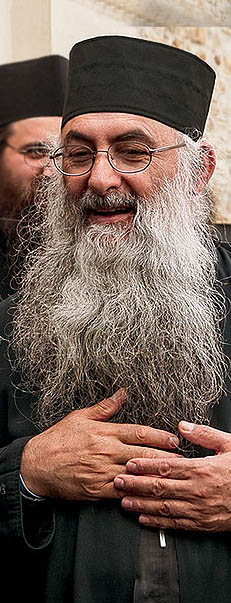Our Relationship with God: 9. Spiritual progress
11 October 2016
As Christ descended first to the nethermost parts of the earth and then ascended above the heavens, so humble love raises up a ladder in the heart of man. The same ladder which Christ used to descend to man, man uses to ascend to God, for ‘in his heart he has purposed to go up.’[1] Man then led by the Spirit of God, curtails sinful practices, eradicates desires and evil thoughts which are enmity against God. He is healed from the pestilence of sin, cultivating the longing for heavenly goods, performing God-pleasing works, entering into the heavenly enlargement of holy love of the Father, and the Son and the Holy Spirit. He proceeds ‘from strength to strength’[2] becoming the son and inheritor of God and the co-heir of Christ.
God knew that no one by himself would be able to receive all of the wealth of His gifts. That is why He did not abandon man in the desolation of his fall, but sent his Only-begotten Son to the world and He perfected a Body in history the Church, to which He imparted all the glory and perfection of His gifts. We become members of the Church through faith in the word of Christ and repentance so that we may conform our minds and hearts to His saving will. To every person who repents is given a unique gift of the Holy Spirit. This holds him united with the wondrous Body of Christ and makes him a partaker in all the gifts of all the members of this sublime communion of grace, of the saints in heaven and the elect of God on earth. In this divine-human communion, man is enriched and in this he has his point of reference, which guides him and keeps him unabated on the path of truth which was revealed by Christ. The relationships between the members of the Body are distinguished by love that works in them according to the measure in which the commandments of Christ are fulfilled. Within the Body, as the Apostle says, ‘we consider one another to provoke unto love and to good works.’[3] Spiritual perfection is possible only in the Body of the Church, in the communion of gifts of all its members. This is confirmed by the Apostle when he says that only ‘with all the saints’ will we be able to comprehend ‘what is the breadth, and length, and depth, and height’[4] of the love of Christ.
In miniature, we see the same spiritual progress realised in the harmonious bond in Christ of husband and wife, when the two live together struggling with humility to complete each other with their specific gifts and thus to arrive at the perfection of selfless love, that is the antechamber of the Heavenly Kingdom.
In our relationships and in communion with God and with men, wherein we must work in order to fulfill our purpose, the freedom of the person has great importance. In God, freedom is absolute, since He is able to create from nothing. He lacks nothing and is in need of nothing. Nevertheless, out of overflowing love, not only did He create man, but for his salvation He also humbled Himself taking the form of a servant and saving sinners from the lowest hell.[5] In man, freedom is of the heart and according to the measure of the gift of God. The more he endeavours to live without sin, the more he is liberated from the tyranny of the passions.
[1] Ps. 83:6 (LXX).
[2] Ps. 84:7.
[3] Heb. 10:24.
[4] Eph. 3:18.
[5] Ps. 86:13.






